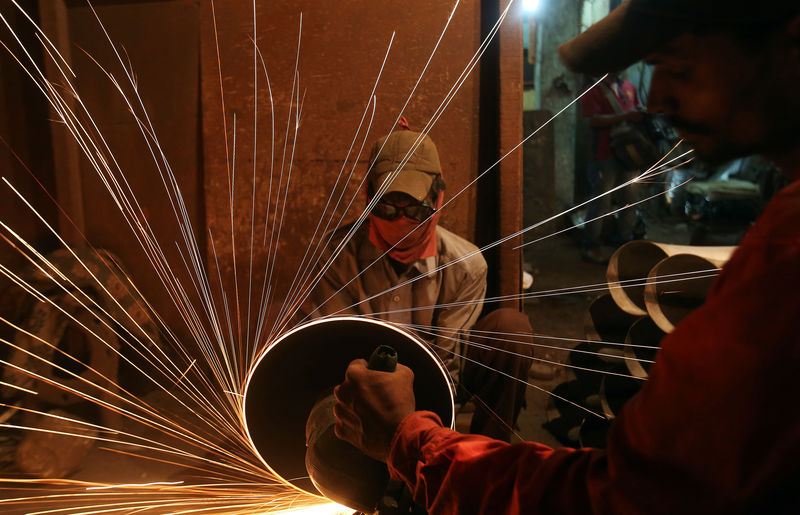 © Reuters. FILE PHOTO: A worker cuts metal inside a workshop manufacturing metal pipes in Mumbai
© Reuters. FILE PHOTO: A worker cuts metal inside a workshop manufacturing metal pipes in MumbaiBENGALURU (Reuters) – India’s factory activity in November expanded at the fastest pace this year, buoyed by a rise in domestic and foreign demand that allowed firms to raise prices, a private survey showed.
Monday’s survey bolsters views that business activity in Asia’s third-largest economy continues to recover from a slowdown and indicated that risks from rising inflation pressure would not dissuade the Reserve Bank of India (RBI) from tightening monetary policy again.
The Manufacturing Purchasing Managers’ Index
It held above the 50-point threshold mark that separates growth from contraction for the 16th straight month.
“The relatively weak demand environment seen earlier in the year showed signs of abating, with clients unfazed by another round of increases in output prices and placing more orders regardless,” noted Pollyanna De Lima, a principal economist at IHS Markit.
Separately, data on Friday showed India’s annual pace of economic growth moderated to 7.1 percent in the July-September quarter, from 8.2 percent in the previous three months.
The pace was pulled down by a slowdown in consumer spending and farm growth at a time Prime Minister Narendra Modi’s government turns its attention to an election due by May.
The latest survey showed the new orders sub-index, a proxy for domestic demand, rose to 55.9 in November – its highest since December 2017 and an encouragement to firms to increase output.
Foreign demand expanded at its quickest pace in nearly four years while optimism about future output increased from October’s 20-month low.
“Signs of rising confidence in the upturn were also provided by the trend for employment, which continued to grow at one of the quickest rates seen in six-years,” de Lima said.
“Supply-chain pressures remained weak, however, which supported a softer rise in input prices.”
Employment growth remained well-above the long-term average of 50.7 in November although firms hired at a slower pace last month than they did in October.
Despite input cost inflation easing to a seven-month low in November, stronger demand let firms raise prices at the fastest pace since February 2017, posing upside risks to inflation.
According to a Reuters poll, the RBI will raise interest rates once next year, after raising them twice this year, to try and contain inflation, which hit a 13-month low of 3.31 percent in October.
Fusion Media or anyone involved with Fusion Media will not accept any liability for loss or damage as a result of reliance on the information including data, quotes, charts and buy/sell signals contained within this website. Please be fully informed regarding the risks and costs associated with trading the financial markets, it is one of the riskiest investment forms possible.
Source: Investing.com




























